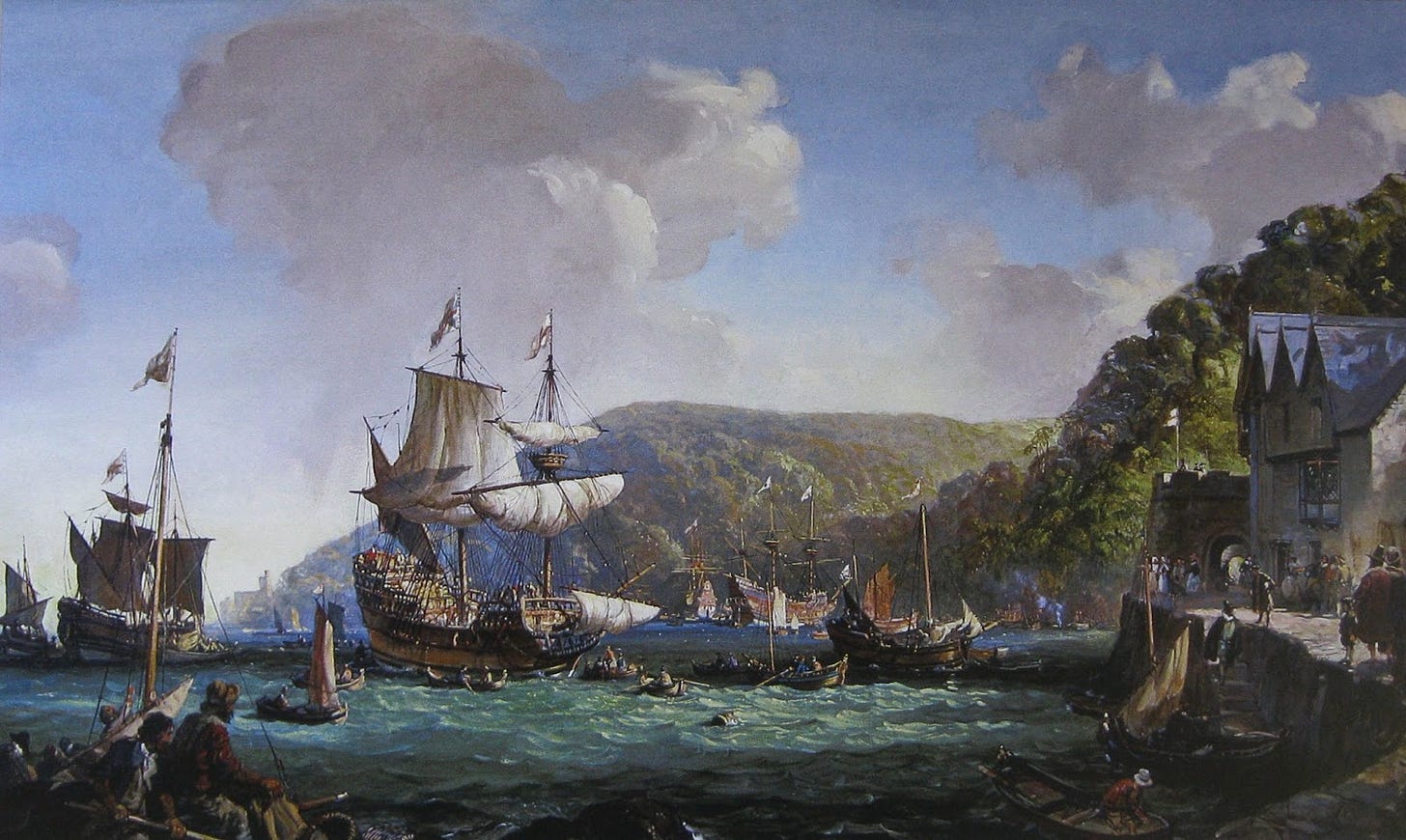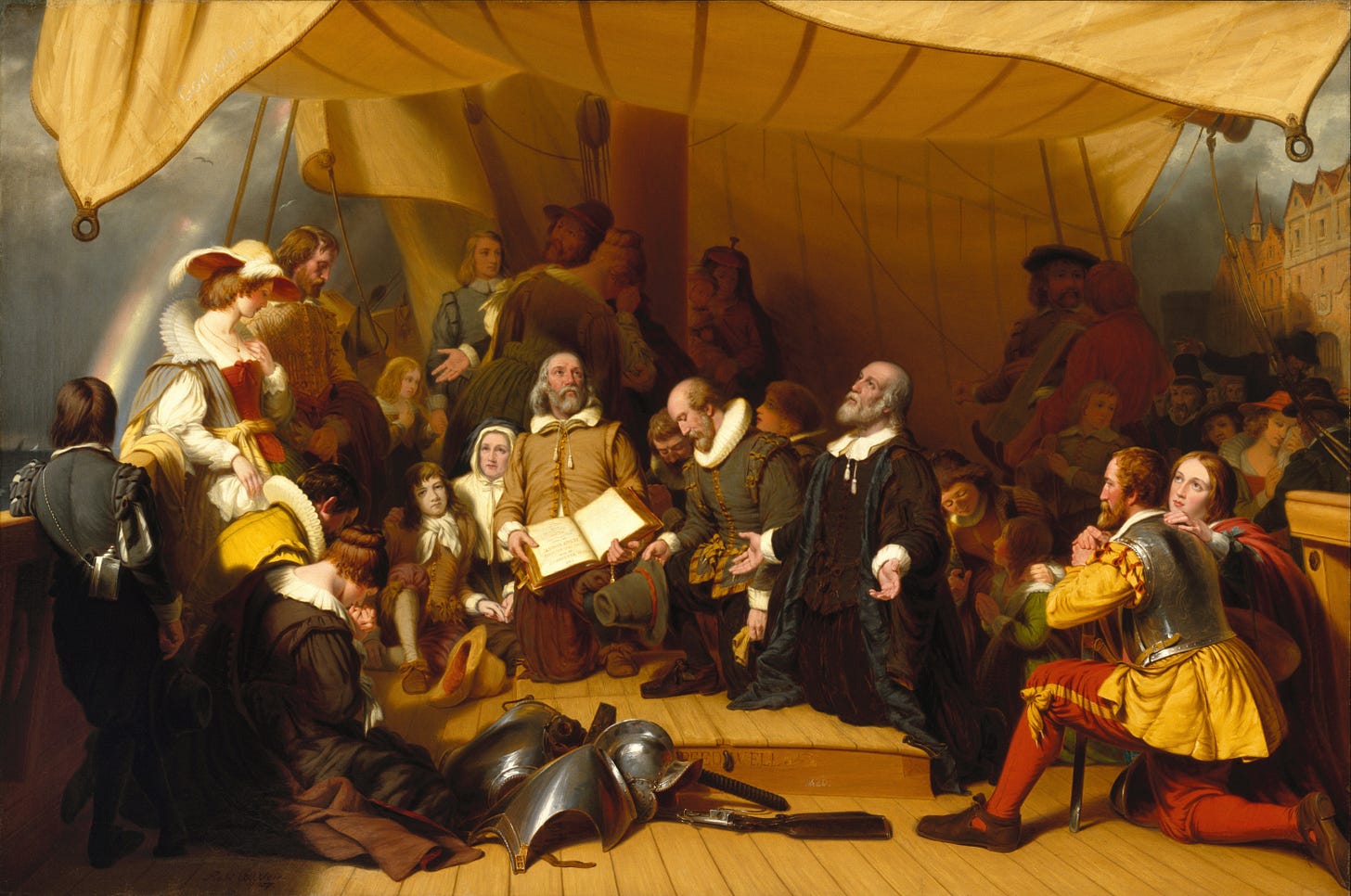The Speedwell (and the Mayflower)
Thanksgiving in Holland in 1620
The Speedwell getting and the Mayflower in Dartmouth Harbor, by Leslie Wilcox.
Thanksgiving: A Reflection on Providence, Gratitude, and the Pilgrim Journey
Thanksgiving stands as a moment in time when we pause to consider not only the blessings of the harvest but also the bountiful grace and providence of God throughout history. For Christians, it is more than a day for feasting; it is a time to acknowledge the steadfast love of our Creator, who has given us every good gift—life, salvation, and the promise of a new creation.
As a lineal descendant of one of the Pilgrims who sailed on the ill-fated Speedwell, my Thanksgiving reflections are deeply tied to the legacy of those who sought to honor God in all their ways. The story of the Speedwell is a profound reminder of God’s sovereignty, even in apparent disappointment, and serves as a lesson in gratitude that transcends circumstances. Those Pilgrims who were forced to remain behind in Leiden, Holland, after the treachery of their ship’s captain, did not lose hope or faith. Instead, they gave thanks, trusting that God’s providence would unfold in His perfect time.
The Speedwell and the Providence of God
In 1620, the Pilgrims prepared to leave Holland, longing for a place where they could worship God freely and establish a community devoted to His glory. Two ships, the Mayflower and the Speedwell, were to carry them to the New World. The Speedwell, however, proved unworthy of the journey. Its captain, unwilling to undertake the arduous crossing, feigned mechanical failures to force its return. Thus, the Pilgrims faced an agonizing choice: remain behind or press on with diminished numbers.
My ancestor was among those who stayed in Leiden, seemingly thwarted in their quest for religious freedom. Yet Scripture reminds us, “The steps of a man are established by the Lord, when he delights in his way” (Psalm 37:23). What seemed like a setback was, in truth, an integral part of God’s plan. The ten years that followed in Leiden were not wasted. They were years of refining, community building, and spiritual preparation. Perhaps the Lord was sparing these individuals from death, for the voyage and first winter in Plymouth were perilous. Or perhaps He was ensuring that future generations—including me—would one day exist. We may never know the specific reasons behind God’s providence, but we can trust His goodness and wisdom.
Thanksgiving in Leiden: Gratitude in Every Circumstance
For those Pilgrims who stayed in Leiden, their first Thanksgiving was not marked by the abundance of a New World harvest but by the faithful provision of God in their present circumstances. They were far from their ultimate goal, yet they trusted that God’s purposes were being fulfilled. This kind of gratitude reflects a profound understanding of God’s sovereignty.
The Apostle Paul writes in 1 Thessalonians 5:18, “Give thanks in all circumstances; for this is the will of God in Christ Jesus for you.” Gratitude is not contingent upon our immediate circumstances but upon the character of God, who provides for His people in ways seen and unseen. The Pilgrims in Leiden understood that their hope was not ultimately tied to a physical destination but to the eternal promises of God.
Their perspective challenges us today. Do we thank God only when our lives align with our plans, or do we trust Him enough to give thanks even in seasons of waiting or disappointment? The Pilgrims’ story reminds us that God’s blessings are not confined to material abundance but are most profoundly revealed in His presence and faithfulness.
The Embarkation of the Pilgrims [on the Speedwell], painting by Robert Walter Weir.
The Infinite Goodness of God
As Christians, our gratitude is rooted in the recognition that God has withheld nothing from us. He has given us our very being, creating us in His image and placing us within the time and space of His creation. He has given us His Son, Jesus Christ, whose life, death, and resurrection secured for us the forgiveness of sins and the hope of eternal life. Paul declares in Romans 8:32, “He who did not spare his own Son but gave him up for us all, how will he not also with him graciously give us all things?”
Furthermore, God has given us the gift of His Spirit, poured into our fragile “jars of clay” (2 Corinthians 4:7). The Spirit equips us with His gifts and bears fruit in our lives. Galatians 5:22-23 reminds us of the fruit of the Spirit: “love, joy, peace, patience, kindness, goodness, faithfulness, gentleness, self-control.” These are the marks of God’s transforming work within us, enabling us to live in gratitude and obedience.
God has also entrusted us with the keys of His Kingdom, making us heirs through the hope of the resurrection. He has held nothing back, pouring Himself into His creation and promising to renew all things. In the consummation of His Kingdom, He will dwell fully with His people, crowding out sin, evil, and death. Revelation 21:3-4 proclaims this glorious future: “Behold, the dwelling place of God is with man. He will dwell with them, and they will be his people, and God himself will be with them as their God. He will wipe away every tear from their eyes, and death shall be no more.”
A Cosmic Perspective on Gratitude
The ultimate promise for the Christian is not tied to a specific place—neither Israel nor the New World—but to the resurrection of the body and the life of the world to come. In the new heavens and the new earth, God will fully inhabit His creation, transforming it into a temple-palace where His glory will dwell eternally. This renewed cosmos will be a place of unending discovery and joy, as we explore the infinite depths of God’s nature and creativity. As C.S. Lewis suggests in The Last Battle, it will be “further up and further in”—a journey into the inexhaustible mystery of an unchanging yet infinite God.
Even now, the finite but expanding universe serves as a mere point of reference for God’s majesty. Every moment of our existence is a gift, every breath a reminder of His sustaining power. The Pilgrims understood this, even in their trials. Their gratitude was not limited to a successful voyage or a bountiful harvest; it was rooted in the reality that God was their provider and sustainer.
Living Out Thanksgiving Today
As descendants of faith-filled men and women, we too are called to live lives marked by gratitude. Thanksgiving is not merely a holiday; it is a posture of the heart, a daily acknowledgment of God’s goodness and provision. In a world often fixated on scarcity and fear, the Christian is called to embody abundance and hope.
This Thanksgiving, let us remember the example of the Pilgrims, both those who sailed on the Mayflower and those who remained behind. Let us give thanks for the visible blessings of family, food, and freedom, but let us also thank God for the unseen ways He is working in our lives. Let us trust that His providence is perfect, even when we do not understand His purposes.
Above all, let us remember that our true promised land is not of this world. It is the resurrection of the body and the life of the world to come. This hope enables us to live with gratitude and joy, no matter our circumstances.
Conclusion: The Pilgrim Heart
The story of the Speedwell reminds us that God’s plans are not thwarted by human treachery or failure. Those Pilgrims who returned to Leiden could have despaired, but instead, they chose to trust in the God who orders all things according to His will. Their faith, perseverance, and gratitude stand as a testament to the power of trusting in God’s providence.
As Christians, we are all pilgrims, journeying through this world toward our true home. Along the way, we will face setbacks, disappointments, and trials, but we can give thanks knowing that God is with us. He is our provider, our sustainer, and the giver of every good gift. This Thanksgiving, may we lift our hearts in gratitude to the One who is able to do immeasurably more than all we can ask or imagine, and may we live as heirs of the everlasting Kingdom, proclaiming His goodness until the day of His glorious return.




